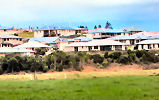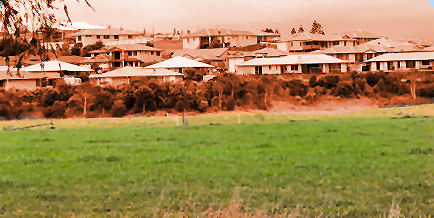 An Australian Farm Institute study provides a comprehensive review of what is currently known about the amount and location of Australian agricultural land, the rate of land use change occurring, and how governments make decisions both in Australia and internationally. Whether or not there will be sufficient good quality land available for agriculture in the future has not been a high priority issue for most of the past two hundred years.
An Australian Farm Institute study provides a comprehensive review of what is currently known about the amount and location of Australian agricultural land, the rate of land use change occurring, and how governments make decisions both in Australia and internationally. Whether or not there will be sufficient good quality land available for agriculture in the future has not been a high priority issue for most of the past two hundred years.

Does Australia need a national policy to preserve agricultural land?
Obviously we do! This is a question being asked by the Australian Farm Institute
The rate of land use is changing, and it's important how governments make decisions both in Australia and internationally. Australia has the sixth largest land area and the lowest population density of almost any nation on earth, so the question of whether or not there will be sufficient good quality land available for agriculture in the future has not been a high priority issue for most of the past two hundred years. It's assumed that land is an infinite resource.
Our large land mass gives false sense of security, but Australia has only a little more than 6% arable land, irregular water supplies, and Australia features 96 percent desert. It lacks regular water, fertile soils and resources to carry its current population load. Yet, politicians remain bent on adding millions more people to Australia.
Obviously property development is more lucrative than horticulture, and their lobbyists are far more cash-up and powerful. Food security is not high on politicians' priority list.
According to the research report, Australia is being too reckless with its best agricultural land, and future generations might regret decisions that are currently being made about the future use of that land. With urban sprawl, mining, CSG and environmental demands taking more and more land, and foreign investors also purchasing significant areas, it is legitimate to ask whether Australia can realistically plan to become the future "food bowl of Asia". It's also legitimate to ask if our government's drive for perpetual economic growth be justified if it means we pay higher prices for imported food, something that may diminish in future years with global population reaches 9 billion.
While Australia appears to have plenty of land, in reality only about 3% is actually suitable for cropping, and even less of this is considered to be prime agricultural land. Low or high Population density and population size can't be compared to the nations in Europe of Asia with fertile soils, high rainfall and high human "carrying capacity".
The report concludes that Australia currently lacks a consistent and comprehensive understanding of where this land is located, or how much of it is being diverted from agriculture each year.
Australia is now a net importer of horticultural products, whereas it was a net exporter only a few years ago. Wheat, dairy, fishing and sugar production are all down from their previous peaks.
Earlier detailed research by researcher Dr McGovern, lecturer in the Queensland University of Technology’s school of economics and finance, found that Australia exports only around 25 per cent of its agricultural product at second-stage production, not 80 per cent as has often been supposed.
There's a great international market opportunity for a four-fold increase in food production in Australia, but there's no explanation on just this magnificent feat is going to be achieved, especially if climate change scientists are correct. A free-market economy has no parameters for the limitations of Nature, and that the security of domestic food supplies must be a priority over exports.
Once high immigration - the driver of our population growth - created jobs and an economy of scale, now our population growth is threatening our local fresh food supplies, and it must be slashed. We can't rely on imported food as global overpopulation will mean countries will need the food for their own populations. Food is more important than a "healthy" GDP!
Property development and real estate is obviously more lucrative than growing vegetables. It's about short-term profits and cash flows than real planning. What's the use of economic growth - a pseudonym now for population growth - without food security?
We must stabilize our numbers or we will be no better off than bacteria in a petri dish, bemoaning the lack of room for growth, knowing our final demise but being trapped by a leadership vacuum on population and its implications for food security.
The remarks made by prominent Australian businessman and environmentalist, Dick Smith that in 100 years time people in Australia will be starving to death is not implausible.
Minister for Sustainable Population Tony Burke remains silent, while our growth-based economy continues unfettered. . It's a number-free ministerial policy.
See also: The Groundwater Footprint: The Privatisation of the World's Water Resources of 16 August 2012.

Comments
nimby
Thu, 2012-05-31 10:33
Permalink
Growcom report of Food Security 2011
AustraliaForAus... (not verified)
Fri, 2012-06-01 10:36
Permalink
Writer sees Bob Hawke as guilty of treason and treachery
Sheila Newman
Fri, 2012-06-01 13:03
Permalink
Lease land, don't sell it
admin
Fri, 2012-06-01 21:06
Permalink
Hawke's treachery hardly new
A comment, linking back to this story and quoting the article and some of the comments attracted the following response on johnquiggin.com:
... I saw Bob Hawke as guilty of treason and treachery long ago for opening up Australia to the free – read unfair – market without warning or compensation to most of those who would be adversely affected.
Howard just turbocharged the process.
Nick Xenophon said this week that the Eurozone regards Australia as the “Taliban” of free markets. In other words, the “fundamentalists” of free markets.
Thanks for the link. It’s very informative.
admin
Fri, 2012-06-01 21:51
Permalink
Why neo-liberal markets are not free
The following is adapted from a coment posted to johnquiggin.com in response to Salient Green's comment, reproduced above.
I remember how, in 1983, Paul Keating, like a bolt out of the blue, with no
electoral mandate whatsoever, announced that he would 'float' the Australian
Dollar. Although few ordinary Australians realised it, this was the first step
towards an extreme of neo-liberal fundamentalism formalised in Professor Fred
Hilmer's rigged National
Competition Policy inquiry which commenced in 1993.
The description of Australia as the "Taliban" of free markets is most apt.
If the market was truly 'free' then sovereign communities (a.k.a. 'government'
at the local, state and federal levels) would also be free to own and operate
enterprises which produce wealth and provide services.
The fact they are forbidden from doing so shows the very term 'free
market', often used as synonym for economic neo-liberalism, to be lie.
Why shouldn't governments be allowed to operate banks, insurance companies,
manage our retirement income, mine our minerals, build houses, own land and
buildings, manufacture cars and other goods or operate funeral services?
Naomi Klein should could have included a chapter on Australia in The Shock
Doctrine of 2007.
admin
Mon, 2012-06-04 00:22
Permalink
WA Independent opposes foreign buyout of Australian rural land
Western Australian Community Independent, Mark M Aldridge has recently posted a page on his web-site, www.markmaldridge.com, Australia -- Not For Sale on that page is a link to a petition opposed to the sellout of Australian rural land. Please sign.
The article begins:
Mark is also a wildlife carer. The facebook Page for his Willow Bank Wildlife sanctuary is here.
Add comment